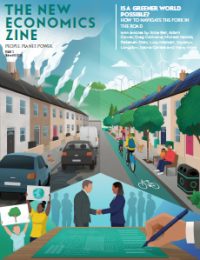Publications The New Economics Zine Issue 4: Is a greener world possible? 02 November 2021 Download the issue Over the last few years there’s been a transformation in how the public thinks and talks about the climate crisis. Thanks to the work of a new wave of activists, spearheaded by the student climate strikers, it seems like the British public and politicians are finally waking up to the dangers of our addiction to fossil fuels. But mainstream attention is on all the wrong things. After a summer of wildfires in the western US, floods in
Topics:
New Economics Foundation considers the following as important:
This could be interesting, too:
Robert Vienneau writes Austrian Capital Theory And Triple-Switching In The Corn-Tractor Model
Mike Norman writes The Accursed Tariffs — NeilW
Mike Norman writes IRS has agreed to share migrants’ tax information with ICE
Mike Norman writes Trump’s “Liberation Day”: Another PR Gag, or Global Reorientation Turning Point? — Simplicius
The New Economics Zine
Issue 4: Is a greener world possible?
02 November 2021
Over the last few years there’s been a transformation in how the public thinks and talks about the climate crisis. Thanks to the work of a new wave of activists, spearheaded by the student climate strikers, it seems like the British public and politicians are finally waking up to the dangers of our addiction to fossil fuels. But mainstream attention is on all the wrong things.
After a summer of wildfires in the western US, floods in London, and deadly heatwaves in Pakistan, the International Panel on Climate Change issued its starkest warning yet: the climate crisis is already happening as a result of how we live and power our economies. But despite all this, we can’t seem to shake the idea that we can solve the climate crisis with an easy fix – whether it’s setting net zero targets without the plans or investment to back them up, flashy new technologies like hydrogen power, or faith in the ability of the market to resolve any sticky problems.
If we don’t intervene to counter this narrative, we’re in danger of trying to solve the climate crisis by channelling all our energy into a system which will continue to funnel wealth towards a small minority, violently extract natural resources from the Global South, and only keep a small sliver of the global population safe from global heating.
But, if we take the right action on the climate crisis, we can create a society that meets our needs and benefits us all. That’s what we are exploring in this issue: how we can navigate the murky waters of greenwash and distraction, and figure out how we should really be thinking about the climate crisis.
Published while the UK is hosting the UN climate summit, Cop26, this issue takes a look at how our economy needs to change to address the climate crisis — featuring articles from Alice Bell, Michael Jacobs, Joycelyn Longdon, Josina Calliste, and more.
Contents
- Editorial
- A turning tide / Luke Murphy
- Explainer: what is Cop? / Michael Jacobs
- Our biggest experiment / Alice Bell
- Rising voices / Anannya Dayaparan
- Earth, wind and fire / Rebekah Diski
- This land is our land /Josina Calliste
- Burning down the house / A conversation between Greg Cochrane and Adam Corner
- Taking the climate crisis to the courts / Lucy Maxwell
- Warmer homes for a cooler planet / Aydin Dikerden
- Techno-fixes alone won’t save us / Jonathon Porritt
- The review: Consumed / Joycelyn Longdon
- You can’t level up without a Green New Deal / Miatta Fahnbulleh
Image: Cat Finnie
Topics Climate change Zine Environment




